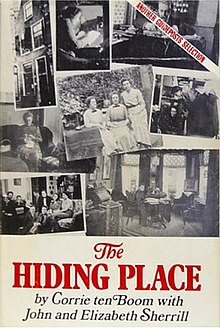The Hiding Place (biography)

Cover, displayed edition published by Bantam Books in October 1974
|
|
| Author | Corrie ten Boom |
|---|---|
| Country | Netherlands |
| Language | English |
| Genre | nonfiction, autobiography |
| Publisher | Chosen Books |
|
Publication date
|
November 1971 |
| Media type | hardcover |
| Pages | 241 pp |
| ISBN | |
| OCLC | 30489558 |
The Hiding Place is a 1971 book on the life of Corrie ten Boom, written by Ten Boom together with John and Elizabeth Sherrill.
The idea of a book on Ten Boom's life began as John and Elizabeth Sherrill were doing research for the book God's Smuggler, about Ten Boom's fellow Dutchman, Anne van der Bijl. Corrie ten Boom was already in her mid-seventies when the Sherrills first heard about her. She was one of Brother Andrew's favorite traveling companions and many of his recollections were about her. In the preface to the book, the Sherrills recount:
It was later made into a film of the same name, along with a comic book adaptation.
The title refers to both the physical hiding place where the Ten Boom family hid Jews from the Nazis, and also to the Scriptural message found in Psalm 119:114 which states, "Thou art my hiding place and my shield: I hope in thy word... "
The book begins with the Ten Boom family celebrating the 100th anniversary of the family watch and watch repair business, now run by the family's elderly father, Casper ten Boom. The business took up the ground floor of the family home (known as the Béjé). Casper lived with his unmarried daughters Corrie (the narrator and a watchmaker herself) and Betsie, who took care of the house. It seemed as if everyone in the Dutch town of Haarlem had shown up to the party, including Corrie's sister Nollie, her brother Willem, and her nephews Peter and Kik. Willem, a minister in the Dutch Reformed Church, brought a Jewish man, who had just escaped from Germany, as a guest. The man's beard had been burned off by some thugs, a grim reminder of what was happening just to the east of the Netherlands.
In the next few chapters, Corrie talks about her childhood, her infirm but glad-hearted mother, and the three aunts who once lived in the Béjé. She talks about the only man she ever loved, a young man named Karel, who ultimately married a woman from a rich family.
Eventually, both Nollie and Willem married. After the deaths of Corrie's mother and aunts, Corrie, Betsie, and their father settled down into a pleasant, domestic life. Then, in 1940, the Nazis invaded the Netherlands.
...
Wikipedia
